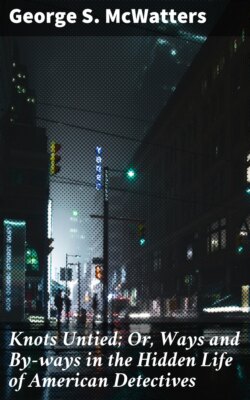Читать книгу Knots Untied; Or, Ways and By-ways in the Hidden Life of American Detectives - George S. McWatters - Страница 31
На сайте Литреса книга снята с продажи.
Оглавление"New York, October 17, 1870.
"To the Hon. Board of Police Commissioners of New York.
"Gentlemen: I beg respectfully to offer my resignation as a patrol policeman, the same to take effect on Tuesday, October 18, 1870.
"This step has been rendered necessary for the following reasons: I have been prohibited by your representative, the late Superintendent, from employing my spare time in the fulfilment of a duty which, in common with all good citizens, I owe to the defenders of our country, the sick and disabled soldiers, and to the widows and orphans of those who perished in the late war; and being determined to fulfil that duty, I have obtained employment elsewhere, under circumstances that will enable me to continue to assist and advise these poor people.
"Respectfully asking your acceptance of my resignation, I remain, gentlemen, yours, &c.,
"George S. McWatters."
The public journals of the times made most complimentary allusion to Officer McWatters when noticing his withdrawal from the police force and acceptance of a post in the custom-house. They spoke of him—but perhaps it were well to let some of them "speak for themselves." We reproduce here the following (all we have space for in this article) from the New York Evening Post and the Daily Times. The former remarked thus:—
"The resignation of George S. McWatters deprives the police force of one of its most faithful and efficient members; but, on the other hand, it enables Mr. McWatters to continue his benevolent and gratuitous services in behalf of the wounded soldiers, and the widows and orphans of those who fell during the late war. Mr. McWatters proposes to open an office, under the auspices of the Ladies' Union Relief Association, and of General Butler, in his capacity of President of the Board of Managers of the National Homes for Disabled Soldiers, where, at certain hours each day, he can be consulted, and will offer relief and assistance. There is now no place in this city where this class of persons can get advice without paying roundly for it, and running the danger of falling into the hands of unprincipled claim agents. Mr. McWatters intends to give his service gratuitously in this good cause, as he has been doing for the last five or six years. He is now filling an office in the custom-house, and Collector Murphy has shown his discriminating good sense in making the appointment."
The Times said:—
"The appointment of Mr. George S. McWatters to the position of storekeeper, under the New York custom-house, was most judicious, and will be heartily approved by those who are familiar with the man and his good deeds. He has been connected with the police department of the city for the past twelve years, and never had a charge preferred against him in all that time. Since the war, in addition to his police duties, he has been an indefatigable worker for the interests of sick and disabled soldiers, and the families of those who died in battle. Hundreds of cases have been investigated by him, and relief obtained for the unfortunate in scores of instances. For these services Mr. McWatters received no remuneration whatever, save the gratitude of those who were the object of his beneficence. His merits were recognized by the collector, and hence the offer of an appointment, which was accepted a few days after."
Thus it was that Officer McWatters ended his connection with the Metropolitan Police, with the honor of the public for his faithfulness and efficiency as an officer, and the applause of all good people for his benevolence and laborious services in the cause of philanthropy. This brings us to the month of October, 1870; since which time Officer McWatters has been attending to his duties as an officer in the custom-house, and pursuing his career as a "Good Samaritan" as usual.
